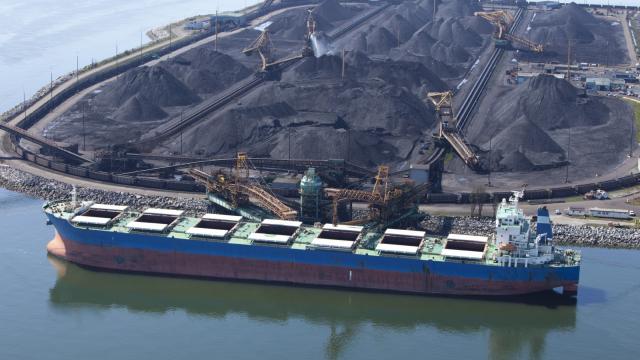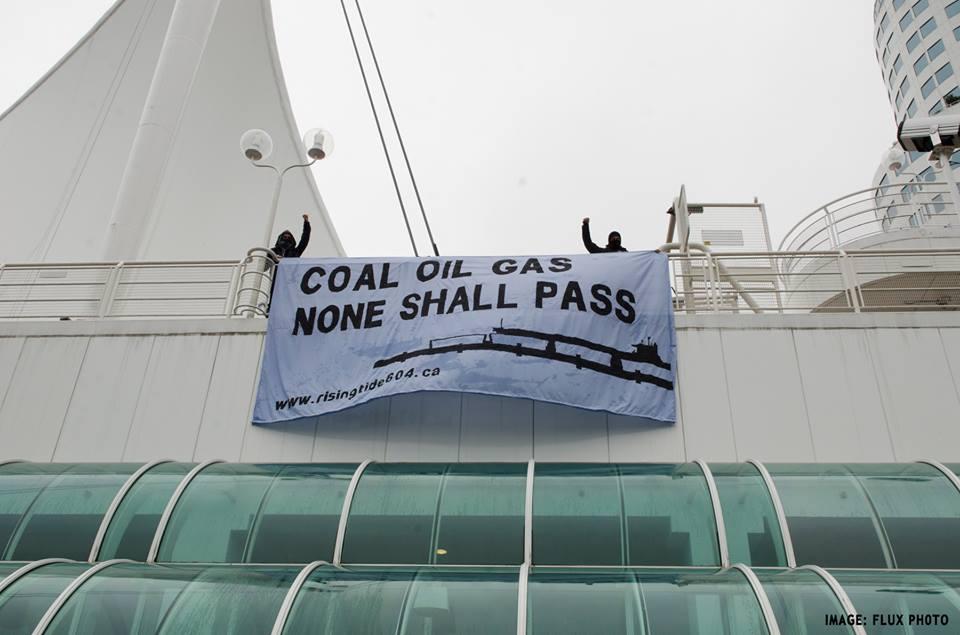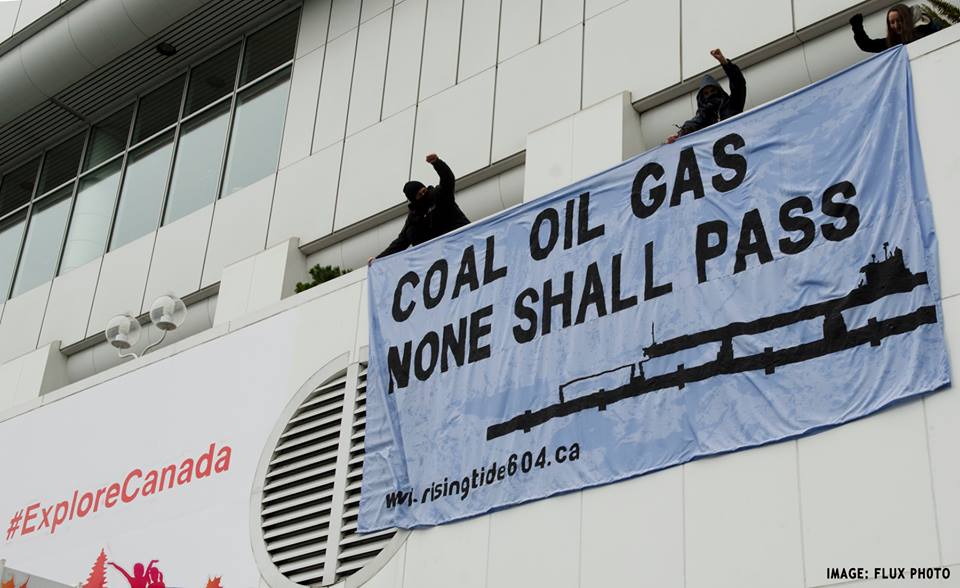
VANCOUVER and COAST SALISH TERRITORIES, British Columbia — No less than 80% of Canada’s coal exports are shipped through British Columbia, and export terminals in the Lower Mainland received over $1 billion earlier this year to improve transport efficiency and capacity. Now, a new proposal for coal export from the Fraser Surrey Docks (FSD) terminal has raised the alarm bells for local residents.
People have just under a month to respond to a recently released environmental impact assessment regarding the FSD proposed coal facility, located just outside Vancouver. The assessment returned saying coal shipments would “not likely cause significant adverse affects” on the environment or community health, sparking public outrage. Immediately, community groups initiated their own public hearing process, staged rallies and banner drops — and Christmas carolers even delivered a lump of coal to the Port of Metro Vancouver (PMV), the governing body that has final approval over the proposal.
Residents say they are not surprised by the assessment, since PMV allowed Fraser Surrey Docks to conduct the study themselves. FSD then commissioned the task out to SNC-Lavalin, a coal industry consultant. In an open letter to PMV, health authorities and researchers said the health impact assessments in the impact assessment were simply the “repackaging of work previously done by other consultants” whose work was previously questioned. The letter stated that “the report does not meet even the most basic requirements of a health impact assessment.”
Another letter from medical professionals also raised concerns about diesel exhaust from coal trains and the impacts on climate change. Combined coal exports from the Fraser Surrey Docks and the recently approved Neptune Terminal would reach 14 million metric tonnes per year. That means three new coal trains making round-trips per day through Metro Vancouver on top of the six that already come through the region.
White Rock Mayor Wayne Baldwin said that his city alone would see 640 more coal trains on the waterfront per year. Other councilors are concerned, not just about air quality degradation from coal particulates and train exhaust, but also the impact on local waterways as coal is transferred from the trains to barges. Mayor Baldwin and numerous White Rock councilors have spoken out against coal alongside the entire Surrey City Council and Vancouver, which banned coal exports within the city limits. None of the municipalities, however, have jurisdiction over the Port of Metro Vancouver’s decision.
During the comment period, PMV claims that it will take citizens' comments into consideration, but it has not said that it will directly respond to the comments or make them public. Residents are calling the process undemocratic, complaining that stakeholders had no input into the assessment and that the PMV is presenting a “sham” process that hides growing public dissent about the growth of coal transport infrastructure. Organizers have created the website RealPortHearings.org to encourage people to submit comments so they can be put on the public record.
The Fraser Surrey Docks assessment is part of a growing trend of both federal and provincial governments to “streamline” environmental reviews, minimizing the time available for public input in order to speed up approvals. The Harper Conservatives in government accomplished this through budget bills, which typically have nothing to do with environmental protections; and B.C. Premier Christy Clark has done this by asking Ottawa’s permission for coal mining projects to forgo federal assessments.
In fact, the Oil and Gas Bulletin reported that Clark’s re-election earlier this year “was the single most important election to the energy landscape in all of North America in several years,” knowing that Clark intended to make B.C. a gateway for fossil fuel exports. After Clark was elected, there was an increase in coal mining project proposals and in proposals for liquid natural gas (LNG) export facilities. Clark also began meeting with other premiers to facilitate tar sands pipeline expansion.
There are currently 10 operating coal mines in British Columbia and more proposals are emerging, including one filed by Fortune Minerals in the Sacred Headwaters in northwestern B.C. — an area Clark promised she would protect from oil and gas development. The mine would impact the traditional territory of the Tahltan First Nation, which contains the origin of three major salmon rivers: the Skeena, Nass, and Stikine. Tahltan elders and drummers have held protests at the site.
“Our goal is to have permanent protection in the area," said Annita McPhee, president of the Tahltan Central Council. "We’re not unreasonable people.”
The B.C. government appointed a mediator to resolve issues between the First Nation and the company, but released a statement suggesting that the mediation process would allow the mine to proceed.
Even as coal mining and export keeps pace with oil and gas project expansion, coal seems to garner comparatively little attention. Protests against the Northern Gateway Pipeline and solidarity demonstrations to support indigenous blockades against fracking have brought thousands to the streets. Meanwhile, the coal industry continues to steal indigenous lands, erode democratic engagement and increase climate pollution.
Late last week, local activist group Rising Tide-Vancouver, Coast Salish Territories dropped a banner saying Coal, Oil, Gas: None Shall Pass, calling attention to the fact that every player in the fossil fuel industry is causing its share of climate pollution while profiting at communities’ expense.
In June, Portland Rising Tide and other community groups rallied on the I-5 interstate bridge between Oregon and Washington, where they dropped a banner with the same message. The demonstration was directed against an oil export facility that would bring tankers to the Columbia River, but it also made the larger point that the extraction, transport and burning of any fossil fuel negatively impacts people and the environment.
Canadian and U.S. organizers have been uniting for more than just a common message. Cross-border organization and communication on a community level may be both strategic and necessary. In fact, one reason for an increase in Canadian proposals, such as the Fraser Surrey Docks, is that similar projects south of the border have faced unwavering opposition from communities in Washington and Oregon.
Three out of six coal export terminal proposals in the two states were rejected. Even the CEO of FSD, Jeff Scott, stated that “facilities in the U.S. are just not available... it could take six to eight years to go through that process….[and] our facility would take six months to build, so timing to market is the difference.”
Increases in coal exports through the Lower Mainland are largely for U.S. thermal coal from Wyoming’s Powder River Basin, suggesting that B.C. is the new destination for coal that Oregon and Washington are successfully blocking. If community groups fail to communicate throughout the region, companies will just transport their carbon pollution across the border.
Corporations and politicians in the area appear to be capitalizing on the fact that B.C. residents are largely paying attention to tar sands pipelines and fracking. Together, they write trade agreements and legislation that allows communities, land and water to be exploited for profit. If government and industry are collaborating with each other and their counterparts across borders, why would grassroots organizers and community members not do the same?
By sending the message that every type of fossil fuel production impacts communities and will face public opposition, organizers can show that they are not just running isolated campaigns but rather are building a broad-based movement of people willing to defend and protect their communities. And as residents living close to coal trains and export terminals build the skills and relationships necessary to fight fossil fuel projects, it's important now more than ever to join these burgeoning alliances with the broader global justice movement.
3 WAYS TO SHOW YOUR SUPPORT
- Log in to post comments













